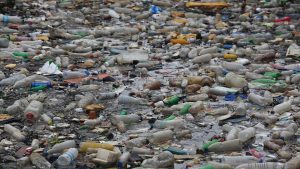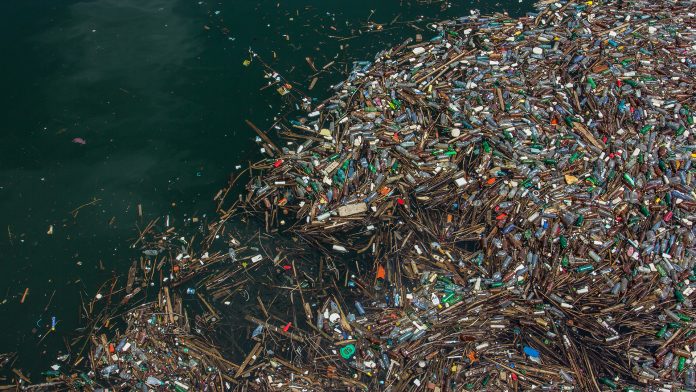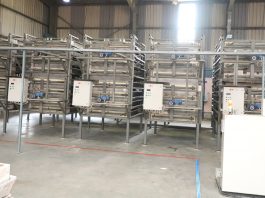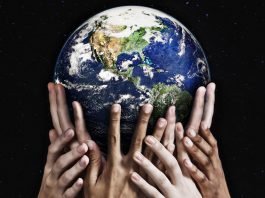Beginning on Monday, an international negotiation meeting in Kenya aims to develop the legally binding Global Plastics Treaty.
Researchers have argued that the Global Plastics Treaty must prioritise upstream issues. These include reducing total production and consumption of plastics, phasing out hazardous chemicals, and tackling fossil fuel subsidies.
There is a worrying level of focus on downstream recycling and waste management, write the researchers. The true solution must address the full life cycle of plastics.
The treaty must focus on early interventions and the people, places, and ecosystems impacted by plastic pollution.
Dr Mengjiao (Melissa) Wang, from Greenpeace Research Laboratories at the University of Exeter, said: “Right now, simply too much attention and capital is focused ‘downstream’ – recycling and cleaning up plastic already in the environment, in many cases just after a single use.
“That is vital work, but it can only be part of the solution, and only if done in a safe, environmentally sound, and socially just way.
“Removing the mess while making more is a doomed strategy. We cannot recycle our way out.
“An effective treaty must be holistic, covering everything from fossil fuel extraction and plastic production to recycling and removing waste that pollutes our land and ocean.”
The research, ‘Chemical simplification and tracking in plastics,’ is published in Science.
Upstream solutions require more investment
Currently, 88% of investment money goes towards downstream recovery and recycling whilst only 4% is directed to upstream reuse solutions.
This imbalance is said to come from the fossil fuel entwined political economy of plastics, which accelerates production, consumption, and waste.
The authors argue the zero draft of the Global Plastics Treaty neglects opportunities for more efficient upstream strategies such as reduction, redesign, and reuse.
The team believe that the treaty should require polymer manufacturers to ensure financing aligns with the zero waste hierarchy by prioritising upstream strategies.

An effective Global Plastics Treaty is required
The new treaty has the potential to become a global mechanism to close a loophole left by the Paris Agreement.
“The problem of plastic pollution is huge, and it can feel overwhelming,” said Dr Lucy Woodall, from the University of Exeter.
“But there are opportunities and challenges at each stage of the life cycle of plastics – from fossil fuel extraction onwards.”
Targets set in the Paris Agreement aim to stop burning fossil fuels; however, they can still be extracted to make plastics. The Global Plastics Treaty would provide a chance to close this opportunity.
What should be included in the treaty?
The researchers highlight several other points the Global Plastics Treaty must include in their work.
“One vital step is to focus on ecosystems,” said Dr Woodall.
“Once in the environment, plastic litter can entangle and choke wildlife, and plastic objects can act as a reservoir for invasive species and concentrate other pollutants.
“Plastics can also break down into potentially toxic micro and nanoplastics.”
The burden of plastic pollution on ecosystems must be considered
The treaty’s zero draft used terms like ‘hotspot’ and ‘clean up’. These terms emphasise concentrations rather than the natural systems and their specific context.
“This implies that the plastics problem can be solved without considering ecosystem restoration and the disproportionate burden of plastic pollution in some ecosystems,” Dr Woodall said.
“Vibrant ecosystems are vital for biodiversity and human health, so protecting them should be the centre of our approach.”
The importance of chemical simplification
One of the key barriers to addressing global plastic pollution is the chemicals in plastics.
Currently, regulations don’t require producers to track or publish information on the levels of harmful chemicals.
The researchers advocate for chemical simplification, reducing the production of hazardous chemicals and increasing transparency along the supply chain. They are hopeful that a Global Plastics Treaty can be agreed upon, but some countries are expected to delay the process.
“When we speak to negotiators, they give us a political ‘reality check’ about balancing ambition with getting a treaty agreed in due time,” Dr Wang said.
“In return, our role as scientists is to provide a scientific reality check about the scale of this problem and the solutions that can actually work to bring us back to the safe operating space of the Earth.
“We need a treaty that is holistic and ambitious, tackling every stage of this problem – extraction, production, resource allocation – to stop the build-up of plastic waste and harmful chemicals in our planet’s precious ecosystems.”









